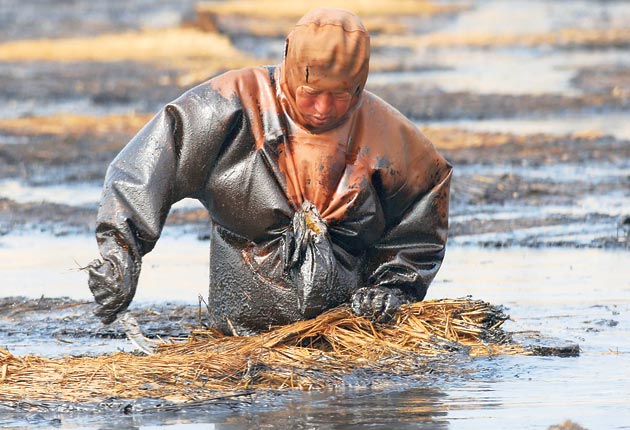China fights to contain an oil disaster of its own

Your support helps us to tell the story
From reproductive rights to climate change to Big Tech, The Independent is on the ground when the story is developing. Whether it's investigating the financials of Elon Musk's pro-Trump PAC or producing our latest documentary, 'The A Word', which shines a light on the American women fighting for reproductive rights, we know how important it is to parse out the facts from the messaging.
At such a critical moment in US history, we need reporters on the ground. Your donation allows us to keep sending journalists to speak to both sides of the story.
The Independent is trusted by Americans across the entire political spectrum. And unlike many other quality news outlets, we choose not to lock Americans out of our reporting and analysis with paywalls. We believe quality journalism should be available to everyone, paid for by those who can afford it.
Your support makes all the difference.Black beaches, black water, an army of clean-up workers struggling to cope, recriminations – this is not the Gulf of Mexico but China, which has just experienced what is believed to be its worst-ever oil spill.
An explosion last weekend at the Xingang oil terminal in the north-eastern port of Dalian, once named China's most liveable city, released a major spillage of crude oil, which has closed fisheries and contaminated beaches along the nearby coast.
Although the amount of oil released, about 11,000 barrels, was but a tiny fraction of what escaped in BP's Deepwater Horizon disaster – over three months that has released anything from 2.2 million to 5.3 million barrels – the political consequences may be nearly as serious, as the spill is throwing the spotlight on the oil industry of a country with a much-criticised environmental record.
Already one clean-up worker has died after falling overboard into the slick, which is now thought to have spread from the port to extend for 360 square miles, as the Chinese authorities make intensive efforts to contain it and dissipate it, in some cases with inadequate equipment. Workers are using gloved hands, plastic bags and – as shown in the picture – straw mats to remove the oil from the water.
The environmental group Greenpeace, which has a team at the scene, urged the government to warn residents on nearby coastlines of the dangers. It said that fishermen without equipment were doing most of the clean-up work at one of Dalian's most popular beaches, Jinshitan.
"They don't even have face masks, the most basic and necessary of precautions. They don't even know that they need to protect their skin from crude oil," Zhong Yu, one of the Greenpeace activists, told the Associated Press. "We strongly urge the government to send professional staff and safety equipment to work on the clean-up process."
But more modern methods are also being employed, including the use of special oil-eating bacteria, grown by a Chinese company, and used by some of the 800 clean-up vessels now actively engaged. The majority of them are fishing boats and the crews are skimming the oil manually from the surface, but 40 special skimmer boats have also been deployed. As many as 2,000 soldiers are involved.
Yesterday details emerged of the explosion which caused the leak. It happened as heavy-grade fuel oil from Venezuela was being offloaded from the Singapore-owned, Liberian-flagged 300,000-tonne supertanker Cosmic Jewel. China's State Administration for Work Safety said that the blast occurred after a chemical agent used to strip sulphur from the oil was injected into the pipeline funnelling the oil ashore, even though the offloading had finished. The pipeline is owned by China National Petroleum Corp., Asia's biggest oil and gas producer by volume.
Investigations also found that the emergency and fire-control system at the oil terminal malfunctioned after the fire damaged electrical wires, making it impossible to shut the valve to the oil tank. "The management was chaotic and information flows were not smooth," the safety body said.
China's transport ministry has ordered ports across the country to have emergency response plans and hold regular safety drills, the state-run Xinhua News Agency reported yesterday. The ministry will also establish a database of all ports that handle dangerous goods.
Join our commenting forum
Join thought-provoking conversations, follow other Independent readers and see their replies
Comments